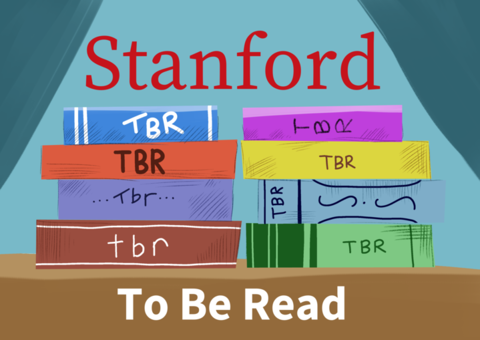In her column “Stanford TBR” (to be read), Cate Burtner recommends books that would resonate with the Stanford community — a reading list compiled for outside the classroom.
Editor’s Note: This article is a review and includes subjective thoughts, opinions and critiques.
Turning each page of Yaa Gyasi’s ’11 “Transcendent Kingdom” is like opening a present.
The novel follows the Stanford alumna’s award-winning 2016 debut, “Homegoing,” which Gyasi wrote based on a Chappell Lougee Scholarship project during her sophomore year. “Transcendent Kingdom,” published in 2020, follows Gifty, a fifth-year Ph.D. candidate at Stanford working on reward-seeking behavior while living with her deeply depressed mother.
From the beginning, I was excited to not only soak up but also analyze Gyasi’s craft. Her debut novel “Homegoing” made it clear that she is an epic writer with sweeping, multigenerational scope including multiple perspectives. “Transcendent Kingdom” shows us another side of Gyasi’s writing. We get a smaller, sometimes molecular, scale because it is told through one woman named Gifty’s perspective as she bears the pressures of her dissolving family. This masterfully crafted story bears lines that I will never forget.
The novel opens at a Ghanaian market in which Gifty’s aunt points out a man mumbling to himself and says, “Look, a crazy person.” Later, she reflects, “No one at all reacted to that man in the market … he was, it seemed to me, at perfect peace.” She then thinks about her mother, “in her bed, infinitely still …wild inside.”
Much of the novel’s story is told retrospectively, as the bulk of the plot revolves around the dwindling of Gifty’s immediate family during her upbringing. Her father, whom she calls the Chin Chin Man, leaves the family and moves back to Ghana. Gifty’s brother Nana, the local legend basketball player, is prescribed OxyContin after an ankle injury, falls into addiction and eventually passes away from an overdose.
The major events of the story occurred years before Gifty’s narration, yet the story combining her journey in the present with her reflections on the past still kept me gripped. The idea of memory overcasts “Transcendent Kingdom” yet is so easy to miss as a narrative device and as a force in our own lives. Gyasi reminds us that, like an overcast sky, memory informs our entire experience yet is so unnoticeable as we make our way through each day. The retrospective structure also adds to the tragedy of Gifty’s family’s past. The reader is constantly aware that as they are given new information about the past, it is too late to change anything. No one can stop the Chin Chin Man from leaving. No one can save Nana from his tragic death.
While the angle of looking back gives context to Gifty’s current life and shows what the family has overcome, it also characterizes Gifty in very clever and subtle ways. We follow her through moments of deep loneliness and deep connection — from her childhood journal entries that begun with “Dear God,” to the inner workings of her adult mind.
I find children’s perspectives to be frequently overlooked in fiction, so I admired the successful execution of that in “Transcendent Kingdom.” Gifty is characterized just as robustly as a child as she is as an adult — she is caring and sensitive to others yet so tough and thick-skinned in her own internal and past struggles.
Something that the novel addressed beautifully was the love a person feels for a passion, rather than just the love one feels for others. Gifty loves science and she loves to challenge herself. Nana loved basketball and was extremely talented. Even the passion for writing from Gyasi herself oozes onto the page and into our imaginations. So much literature is about romantic and familial love, but being driven by passion can bring arguably more meaning into our lives. In my experience, I have found literature centered around passion to be quite rare, but this novel is certainly an example of it.
However, “Transcendent Kingdom” is not a story about passionate people enjoying life. It includes heart-wrenching representations of addiction, complex portrayals of racism and intricate meditations on religion and faith. I first read this book a few years ago, and so many of the lines have been stuck in my head ever since. Reading it again, I was able to pick out these lines and study them. “Transcendent Kingdom” feels like a gift from Gyasi herself with each and every line.
The book’s title also offers interesting insight into its themes. Gifty reflects that “Homo sapiens are the only animal who believed he had transcended his kingdom,” bringing to our attention the things that separate humans from animals, such as religion. While often thought to be at odds in some way, science and religion both characterize the ways in which humans seek to understand the world around us.
I am not only recommending “Transcendent Kingdom” because it is a fantastic book. It is a fantastic book, but it is also steeped in connections to Stanford. The novel is set on campus and based on the experiences of a Stanford postdoctoral researcher. Students may relate to Gifty’s relentless drive for knowledge and for a challenge, as well as her struggles to balance her research with family commitments.
Yaa Gyasi blends and balances science, religion and social issues into one heartbreaking and beautifully-written novel. Gyasi has done a masterful job portraying a lot with few words, writing her characters well and telling a riveting story of past and present. Whatever their interests, any reader can find what they are looking for in “Transcendent Kingdom.”
